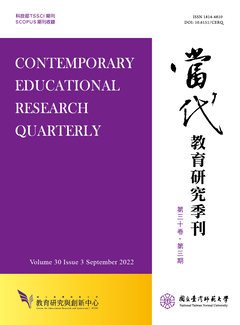

研究目的
本研究的研究目的在於瞭解國小教師對於臺灣的綜合活動領域 課綱的釋意內容、來源、脈絡與行動。
研究設計/方法/取徑
本研究藉由深度訪談來瞭解現職國小教師對於綜合活動領域課 綱與實踐的內心世界與想法,進而建構出現職國小教師對於課綱解 讀與實踐的釋意過程。本研究選取研究參與者為在 J 國民小學(化名) 三年年資以上的教師,且擔任綜合活動具有三年經驗以上之教師六 名。
研究發現或結論
教師在師資培育階段的學習、參與教學實務的活動、認同的教 育理念等對釋意的影響較多,校內專業成長活動與同儕互動的影響 較少。在教師擁有課程實施自主性及教師專業互動少的學校脈絡下, 教師的似真性想法與行動較少獲得同儕的回饋。教師對於綜合活動 領域課綱的釋意內容,大部分符合課綱的理念,少部分是似真性想法。學校活動及其他領域課程占用綜合活動上課時數的釋意行動,造成綜合活動領域主體性模糊的現象。
研究原創性/價值
過去研究對於國小教師如何詮釋綜合活動領域課綱並未有深入 探討,因此本研究採用釋意理論,探究國小教師對於綜合活動領域 課綱的釋意來源、脈絡、內容與行動。
教育政策建議或實務意涵
建議可強化教師在綜合活動領域的課程意識、反思與教學策略。 安排研習前,事先調查教師們綜合活動領域所遇到的問題,然後據 以安排研習內容與方式。另外,新課綱在推廣時,應該善用多元管 道,包含研習、工作坊、網路課程、線上討論區、教師專業社群、 校長與主任課程領導等。
Purpose
This study investigated the content, sources, contexts, and actions pertaining to elementary school teachers’ sensemaking for the learning area of integrative activities in curriculum guidelines in Taiwan.
Design/methodology/approach
In this study, in-depth interviews were conducted to procure elementary school teachers’ perceptions regarding the curriculum guidelines of the integrative activities learning area and their interpretation of the curriculum guidelines during the curriculum implementation were analyzed. The participants were six teachers who worked at the J elementary school(pseudonym) for over 3 years, and also taught in the integrative activities learning area for 3 years or more.
Data were collected through interviews. Coding categories of the study were accomplished after repetitively reading interview transcripts. The study data were coded and analyzed, and the study conclusions were formed.
Findings/results
This research investigated learning in the teacher education stage, involved participation in teaching practices, and identified the educational concepts that have a high influence on teachers’ sensemaking. Professional growth activities and peer interactions within a school had less influence on teachers’ sensemaking. As a consequence of teachers’ curriculum autonomy and limitedprofessional interactions between teachers, peers could only provide little feedback pertaining to the teachers’ actions and the ideas of plausibility. Most of the teachers’ sensemaking content of theintegrative activities learning area curriculum was in accordance with the curriculum guidelines, and a minor part of their sensemakingpertained to the ideas of plausibility. The school’s activities andother curriculum-related tasks occupied the hours allocated for the integrative activities learning area. This sensemaking action led toambiguity concerning the subjectivity of the curriculum.
Originality/value
Studies have not conducted detailed analyses regarding elementary school teachers’ interpretations of the curriculum guidelines of integrative activities learning area. Therefore, this study applied the sensemaking theory to investigate the content, sources, contexts, and actions related to elementary school teachers’ sensemaking for the curriculum guidelines of integrative activities learning area.
Suggestions/implications
To increase teachers’ curriculum awareness, reflection, and teaching strategies in the integrative activities area, a seminar sponsorshould analyze teachers’ problems related to the integrative activities learning area before arranging the content and methods used in theseminar.
Schools and teachers’ professional development seminar programsshould use diversified channels, such as seminars, workshops, onlinecourses, online forums, teachers’ organizations, and school leadership to promote the curriculum.

This work is licensed under a Creative Commons Attribution-NonCommercial 3.0 Taiwan License.
Center for Educational Research and Innovation, National Tawain Normal University
162, Ho-Ping East Rd, Sec. 1, Taipei, Taiwan | Tel:+886-2-7749-3670 | E-mail: cerecerq@gmail.com
CERI | NTNU | E-mail Alerts | Open Journal System
© 2014 CERI-NTNU
